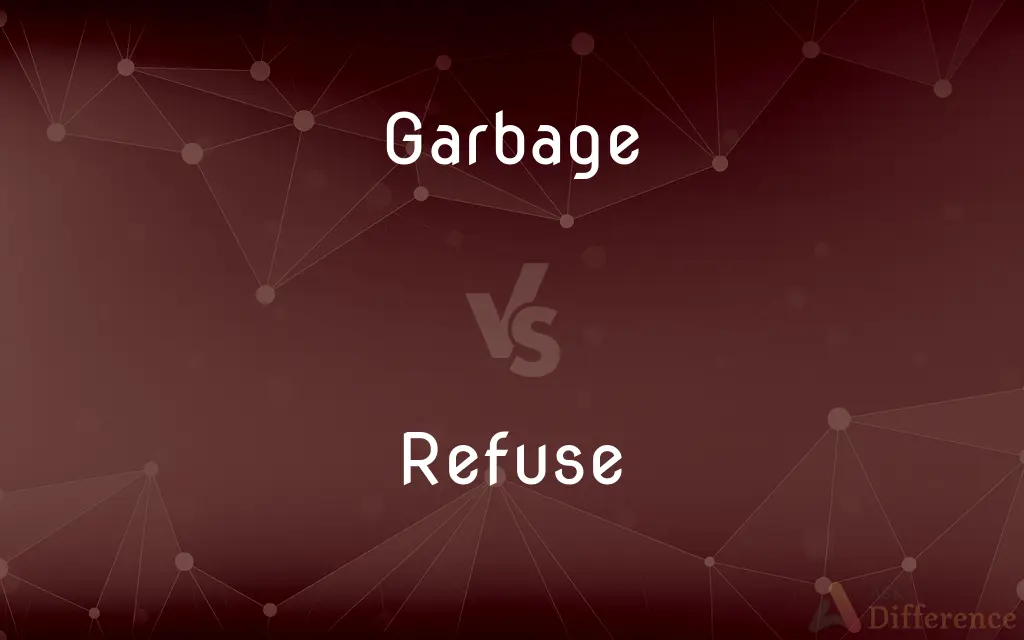Garbage vs. Refuse — What's the Difference?
By Tayyaba Rehman & Maham Liaqat — Updated on April 3, 2024
Garbage refers to waste from kitchen and food, focusing on biodegradability, while refuse encompasses all types of household waste, including garbage and non-biodegradable items.

Difference Between Garbage and Refuse
Table of Contents
ADVERTISEMENT
Key Differences
Garbage primarily consists of organic waste generated from kitchen activities, such as food scraps and peels. It is biodegradable, meaning it can break down naturally over time and is often composted. Refuse, on the other hand, is a broader term that includes not only organic kitchen waste but also non-biodegradable items such as plastics, metals, and glass.
While garbage is usually disposed of through composting or biodegradable waste management systems to minimize environmental impact, refuse requires more varied methods of disposal. This includes recycling for materials that can be reprocessed, landfilling for non-recyclables, and incineration, depending on the nature of the waste. This distinction underlines the need for different handling and disposal strategies for garbage versus refuse.
Garbage, being organic, poses different environmental challenges compared to refuse. It can attract pests and produce odors as it decomposes, whereas the environmental impact of refuse largely depends on the materials it contains. For instance, plastic waste can persist in the environment for centuries, contributing to pollution and harming wildlife.
In terms of collection and management, garbage is often collected separately from other types of refuse in areas with organized waste management systems. This segregation supports more efficient recycling and composting processes. In contrast, refuse, being more diverse, may require sorting either by the waste producer or at a waste management facility to separate recyclable and non-recyclable materials.
The terminology used can also reflect regional preferences or policies regarding waste management. For example, some locales may use "garbage" to refer specifically to food waste, while "refuse" might be used in a legal or policy context to encompass all solid waste, highlighting the importance of local waste management practices and regulations in shaping these definitions.
ADVERTISEMENT
Comparison Chart
Definition
Organic waste from kitchen and food.
All types of household waste, including garbage.
Composition
Biodegradable material.
Includes both biodegradable and non-biodegradable materials.
Disposal Methods
Composting, biodegradable waste management.
Recycling, landfilling, incineration.
Environmental Impact
Attracts pests, can produce odors during decomposition.
Varies by material, includes long-term pollution from non-biodegradables.
Collection and Management
Often collected separately for composting.
Requires sorting for recycling and disposal.
Compare with Definitions
Garbage
Material typically managed through composting.
Their community garden composted local household garbage.
Refuse
Mixed waste materials, requiring sorting before disposal.
They sorted their refuse into separate bins for glass, plastic, and paper.
Garbage
Biodegradable waste from kitchens and food.
He took out the garbage, which was full of vegetable peels.
Refuse
All household waste, including garbage and non-biodegradables.
The city's refuse collection service includes recycling pickup.
Garbage
Food scraps disposed of in homes and restaurants.
They separated the garbage from the recyclables.
Refuse
Broad term encompassing all types of waste.
The new waste management policy addressed the handling of refuse more efficiently.
Garbage
Waste that can attract pests if not properly managed.
To avoid rats, they stored their garbage in sealed bins.
Refuse
Items discarded by households and businesses.
After the garage cleanout, there was a significant amount of refuse to dispose of.
Garbage
Organic waste subject to decomposition.
The garbage began to emit a foul odor after a few days.
Refuse
Non-recyclable waste destined for landfills.
The refuse was taken to the landfill once a week.
Garbage
Garbage, trash, rubbish, or refuse is waste material that is discarded by humans, usually due to a perceived lack of utility. The term generally does not encompass bodily waste products, purely liquid or gaseous wastes, nor toxic waste products.
Refuse
To indicate unwillingness to do, accept, give, or allow
She was refused admittance. He refused treatment.
Garbage
Rubbish or waste, especially domestic refuse
A garbage dump
Garbage littered the estate
Refuse
To indicate unwillingness (to do something)
Refused to leave.
Garbage
Food wastes, as from a kitchen.
Refuse
To decline to jump (an obstacle). Used of a horse.
Garbage
Refuse; trash.
Refuse
To decline to do, accept, give, or allow something.
Garbage
A place or receptacle where rubbish is discarded
Tossed the apple core into the garbage.
Refuse
Items or material discarded or rejected as useless or worthless; trash or rubbish.
Garbage
Worthless or nonsensical matter; rubbish
Their advice turned out to be nothing but garbage.
Refuse
Discarded, rejected.
Garbage
Inferior or offensive literary or artistic material.
Refuse
Collectively, items or material that have been discarded; rubbish, garbage.
Garbage
Food waste material of any kind.
Refuse
(obsolete) refusal
Garbage
Useless or disposable material; waste material of any kind.
The garbage truck collects all residential municipal waste.
Refuse
(transitive) To decline (a request or demand).
My request for a pay rise was refused.
Garbage
A place or receptacle for waste material.
He threw the newspaper into the garbage.
Refuse
(intransitive) To decline a request or demand, forbear; to withhold permission.
I refuse to listen to this nonsense any more.
I asked the star if I could have her autograph, but she refused.
Garbage
Nonsense; gibberish.
This machine translation is garbage
Refuse
(military) To throw back, or cause to keep back (as the centre, a wing, or a flank), out of the regular alignment when troops are about to engage the enemy.
To refuse the right wing while the left wing attacks
Garbage
Something or someone worthless.
Refuse
To disown.
Garbage
(obsolete) The bowels of an animal; refuse parts of flesh; offal.
Refuse
To melt again.
Garbage
An easy shot.
Refuse
To deny, as a request, demand, invitation, or command; to decline to do or grant.
That never yet refused your hest.
Garbage
To eviscerate
Refuse
To throw back, or cause to keep back (as the center, a wing, or a flank), out of the regular aligment when troops ar about to engage the enemy; as, to refuse the right wing while the left wing attacks.
Garbage
(informal) bad, crap, shitty
Refuse
To decline to accept; to reject; to deny the request or petition of; as, to refuse a suitor.
The cunning workman never doth refuseThe meanest tool that he may chance to use.
Garbage
Offal, as the bowels of an animal or fish; refuse animal or vegetable matter from a kitchen; hence, anything worthless, disgusting, or loathsome.
Refuse
To disown.
Garbage
To strip of the bowels; to clean.
Refuse
To deny compliance; not to comply.
Too proud to ask, too humble to refuse.
If ye refuse . . . ye shall be devoured with the sword.
Garbage
Food that is discarded (as from a kitchen)
Refuse
Refusal.
Garbage
A worthless message
Refuse
That which is refused or rejected as useless; waste or worthless matter.
Garbage
A receptacle where garbage is discarded;
She tossed the moldy bread into the garbage
Refuse
Refused; rejected; hence; left as unworthy of acceptance; of no value; worthless.
Everything that was vile and refuse, that they destroyed utterly.
Refuse
Food that is discarded (as from a kitchen)
Refuse
Show unwillingness towards;
He declined to join the group on a hike
Refuse
Refuse to accept;
He refused my offer of hospitality
Refuse
Elude, especially in a baffling way;
This behavior defies explanation
Refuse
Refuse to let have;
She denies me every pleasure
He denies her her weekly allowance
Refuse
Resist immunologically the introduction of some foreign tissue or organ;
His body rejected the liver of the donor
Refuse
Refuse entrance or membership;
They turned away hundreds of fans
Black people were often rejected by country clubs
Common Curiosities
How do garbage and refuse differ in composition?
Garbage is organic and biodegradable, while refuse includes a broader range of materials, including non-biodegradables.
What is garbage?
Garbage refers to biodegradable waste, primarily from kitchens and food preparation.
What is refuse?
Refuse includes all types of household waste, both biodegradable and non-biodegradable.
How is refuse disposed of?
Refuse disposal methods include recycling, landfilling, and incineration, depending on the materials.
Can refuse include recyclable materials?
Yes, refuse can include recyclables, which need to be sorted and processed differently from non-recyclables.
What disposal methods are used for garbage?
Garbage is typically composted or managed through biodegradable waste systems.
Why is it important to separate garbage from refuse?
Separating garbage from refuse facilitates more efficient recycling and composting, reducing environmental impact.
How does refuse impact the environment?
The environmental impact of refuse varies, with non-biodegradables like plastics contributing to long-term pollution.
What challenges does refuse management pose?
Refuse management is challenging due to the need to sort diverse materials and handle them through different disposal paths.
Is all kitchen waste considered garbage?
Most kitchen waste is considered garbage, but non-biodegradable kitchen waste, like packaging, falls under refuse.
Are garbage and refuse collected together?
In many areas, garbage is collected separately from other refuse to optimize waste management practices.
What environmental issues are associated with garbage?
Garbage can attract pests and produce odors as it decomposes, posing sanitation concerns.
Can garbage be recycled?
While not "recycled" in the traditional sense, garbage can be composted, returning nutrients to the soil.
Share Your Discovery

Previous Comparison
Wooden vs. Wood
Next Comparison
Jujube vs. DateAuthor Spotlight
Written by
Tayyaba RehmanTayyaba Rehman is a distinguished writer, currently serving as a primary contributor to askdifference.com. As a researcher in semantics and etymology, Tayyaba's passion for the complexity of languages and their distinctions has found a perfect home on the platform. Tayyaba delves into the intricacies of language, distinguishing between commonly confused words and phrases, thereby providing clarity for readers worldwide.
Co-written by
Maham Liaqat












































